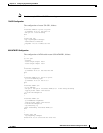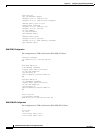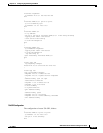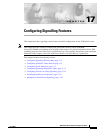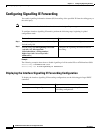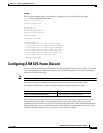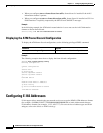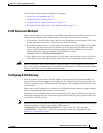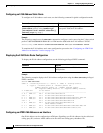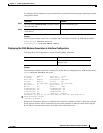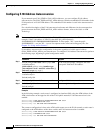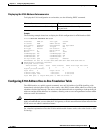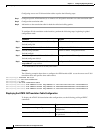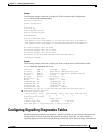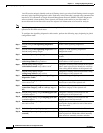
17-5
ATM Switch Router Software Configuration Guide
OL-7396-01
Chapter 17 Configuring Signalling Features
Configuring E.164 Addresses
The following sections describe configuring E.164 support:
• E.164 Conversion Methods, page 17-5
• Configuring E.164 Gateway, page 17-5
• Configuring E.164 Address Autoconversion, page 17-8
• Configuring E.164 Address One-to-One Translation Table, page 17-9
E.164 Conversion Methods
There are three features you can configure on the ATM switch router for E.164 address conversion. The
feature you chose depends on the address format you are using. The features are as follows:
• E.164 gateway—Use this feature when addresses are in international code designator (ICD) or data
country code (DCC) format and a call must traverse an E.164 network.
• E.164 address autoconversion—Use this feature when addresses are in E164_ZDSP or E.164_AESA
format and a call must traverse an E.164 network. An E.164_AESA uses the ATM end system
address (AESA) format with the E.164 number embedded; an E164_ZDSP is an E164_AESA
address with all zeros after the embedded E.164 number; for example,
45.000001234567777F00000000.000000000000.00.
• E.164 address one-to-one translation table—Use this feature when you want to create an E.164 to
AESA address translation table manually. This feature is not recommended for most networks.
Caution Manually creating the E.164 to AESA address translation table is a time consuming and error prone
process. We strongly recommend that you use either the E.164 gateway or E.164 autoconversion feature
instead of the E.164 one-to-one address translation feature.
Configuring E.164 Gateway
The E.164 gateway feature allows calls with AESAs to be forwarded, based on prefix matching, on
interfaces that are statically mapped to E.164 addresses. To configure the E.164 gateway feature, you
must first configure a static ATM route with an E.164 address, then configure the E.164 address to use
on the interface.
When a static route is configured on an interface, all ATM addresses that match the configured address
prefix are routed through that interface to an E.164 address.
Signalling uses E.164 addresses in the called and calling party IEs, and uses AESAs in the called and
calling party subaddress IEs. For a detailed description of how the E.164 gateway feature works, refer
to the Guide to ATM Technology.
Note Enter access lists for E.164 addresses in the E164_AESA format, not native E.164 format. For example,
if the E.164 address is 7654321, then the E164_AESA format is
45.000000007654321F00000000.000000000000.00. To filter prefix “765”, enter the prefix
45.00000000765..., not just 765.... Access lists operate on the called and calling party IEs. See
Chapter 12, “Using Access Control.”



